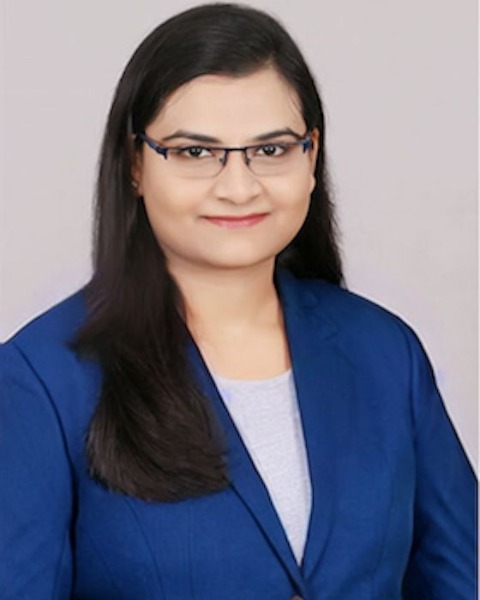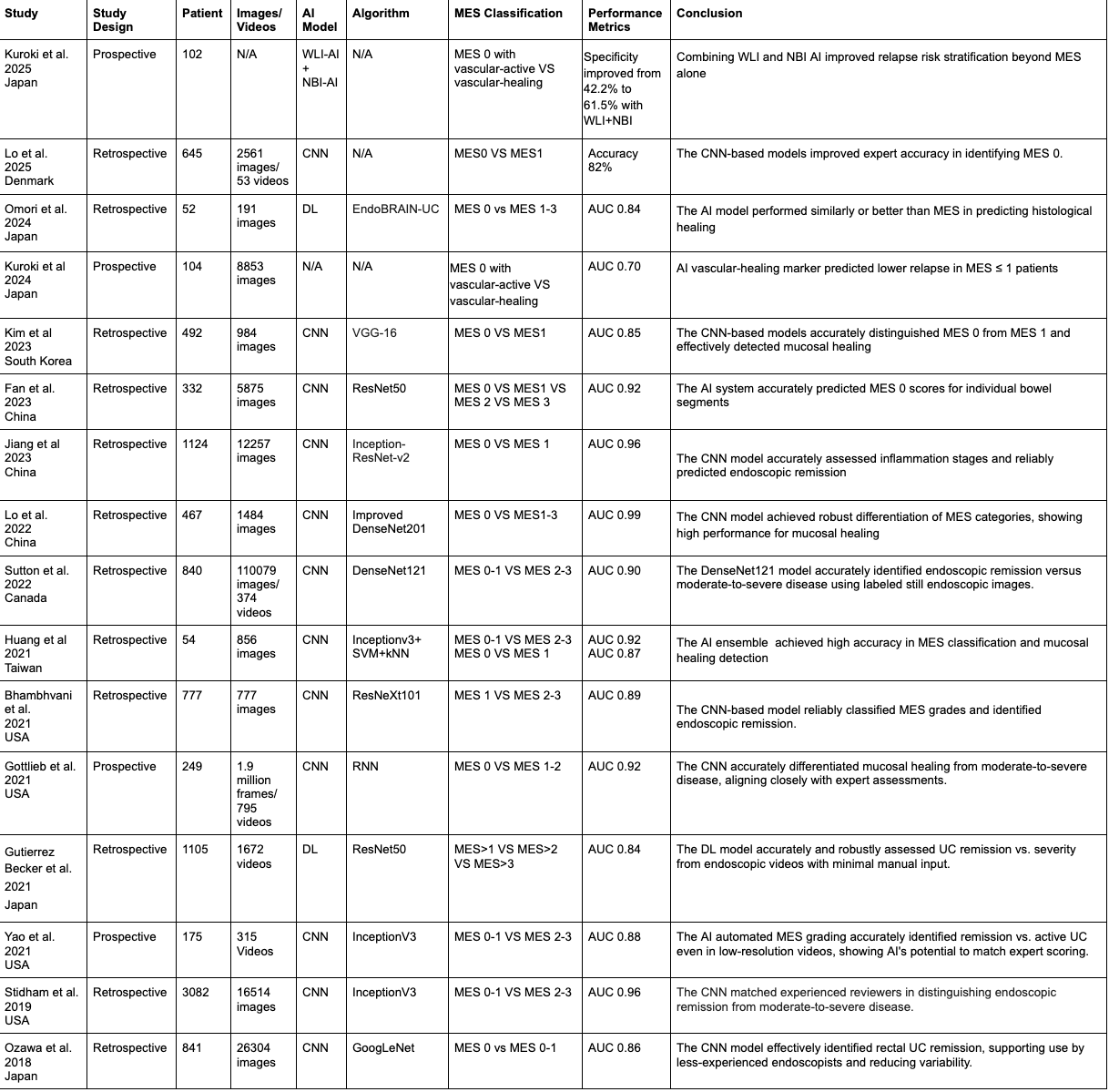Monday Poster Session
Category: IBD
P3318 - Leveraging Artificial Intelligence for Endoscopic Healing in Ulcerative Colitis: A Systematic Review Anchored on Mayo Endoscopic Subscoring
Monday, October 27, 2025
10:30 AM - 4:00 PM PDT
Location: Exhibit Hall

Bhavana Baraskar, MD (she/her/hers)
Mary Washington Healthcare
Fredericksburg, VA
Presenting Author(s)
Bhavana Baraskar, MD1, Neha Singh, MD2, Priyatham Gurram, MD3, Rishika Trivedi, MD4, Helai Hussaini, MD5, Mohammed Mustafa Nayeem, MD6, Jyoti Yadav, MBBS7, Jithin Kolli, MBBS8, Rupak Desai, MBBS9
1Mary Washington Healthcare, Fredericksburg, VA; 2North Alabama Medical Center, Florence, AL; 3Central Michigan University College of Medicine, Saginaw, MI; 4DHR Health, McAllen, TX; 5west anaheim medical center, Anaheim, CA; 6University of Colorado- Parkview medical center, Pueblo, CO; 7JSS Medical college, Mysore, Karnataka, India; 8JSS MEDICAL COLLEGE, Andra Pradesh, Andhra Pradesh, India; 9Independent Outcomes Researcher, Atlanta, GA
Introduction: Mucosal healing is a key treatment goal in ulcerative colitis (UC), offering prognostic value beyond conventional endoscopic remission. The Mayo Endoscopic Subscore (MES), which classifies inflammation into four stages: 0 (normal/inactive), 1 (mild), 2 (moderate), and 3 (severe), is widely used to assess healing but is limited by subjectivity and variability. Histological assessment is more precise but invasive and impractical for routine use. Artificial intelligence (AI) offers a promising solution by automating and standardizing endoscopic evaluation. This systematic review assesses the diagnostic accuracy and clinical utility of AI models in detecting mucosal healing in UC, as defined by MES.
Methods: A systematic search of PubMed and Google Scholar was performed through 2025 in accordance with PRISMA guidelines to identify studies evaluating machine learning (ML) and deep learning (DL) models for detecting mucosal healing in UC using the MES classifications. Eligible studies involved expert-labeled MES data to train and validate AI models. Data on study design, model development, diagnostic accuracy, and area under the curve (AUC) values were extracted.
Results: Sixteen studies (2015–2025) involving over 11,000 patients and more than 200,000 endoscopic images/videos evaluated AI models for MES classification in UC. Most commonly used Convolutional neural networks (CNN) architectures (e.g., ResNet, DenseNet, InceptionV3) targeted MES 0 vs. 1 or 0–1 vs. 2–3, reflecting their focus on detecting mucosal healing versus active disease. Reported AUCs ranged from 0.70 to 0.99, with several models achieving ≥0.95, indicating high accuracy for detecting mucosal healing. Prospective studies demonstrated the clinical feasibility and reliability of AI models. Integration of vascular healing markers and multimodal imaging (WLI+NBI) enhanced relapse prediction. Across studies, AI consistently outperformed or supported expert assessments, especially in differentiating MES 0 from 1, an area prone to interobserver variability, highlighting its potential to standardize endoscopic scoring.
Discussion: This review highlights the potential of ML and DL models, specifically CNN, to accurately detect mucosal healing in ulcerative colitis, including alignment with histological remission. These AI tools offer a non-invasive, standardized approach that may improve disease monitoring. Further clinical validation and integration into treat-to-target strategies are needed to optimize patient management.

Figure: Table 1: Contemporary analysis of the studies showing types of AI models used and their performance
AI – Artificial Intelligence, ML – Machine Learning, DL – Deep Learning, MES – Mayo Endoscopic Subscore, UC – Ulcerative Colitis, CNN – Convolutional Neural Network, DNN – Deep Neural Network, RNN – Recurrent Neural Network, SVM – Support Vector Machine, k-NN – k-Nearest Neighbor, WLI – White-Light Imaging, NBI – Narrow-Band Imaging, AUC – Area Under the Curve, N/A – Not Available
Disclosures:
Bhavana Baraskar indicated no relevant financial relationships.
Neha Singh indicated no relevant financial relationships.
Priyatham Gurram indicated no relevant financial relationships.
Rishika Trivedi indicated no relevant financial relationships.
Helai Hussaini indicated no relevant financial relationships.
Mohammed Mustafa Nayeem indicated no relevant financial relationships.
Jyoti Yadav indicated no relevant financial relationships.
Jithin Kolli indicated no relevant financial relationships.
Rupak Desai indicated no relevant financial relationships.
Bhavana Baraskar, MD1, Neha Singh, MD2, Priyatham Gurram, MD3, Rishika Trivedi, MD4, Helai Hussaini, MD5, Mohammed Mustafa Nayeem, MD6, Jyoti Yadav, MBBS7, Jithin Kolli, MBBS8, Rupak Desai, MBBS9. P3318 - Leveraging Artificial Intelligence for Endoscopic Healing in Ulcerative Colitis: A Systematic Review Anchored on Mayo Endoscopic Subscoring, ACG 2025 Annual Scientific Meeting Abstracts. Phoenix, AZ: American College of Gastroenterology.
1Mary Washington Healthcare, Fredericksburg, VA; 2North Alabama Medical Center, Florence, AL; 3Central Michigan University College of Medicine, Saginaw, MI; 4DHR Health, McAllen, TX; 5west anaheim medical center, Anaheim, CA; 6University of Colorado- Parkview medical center, Pueblo, CO; 7JSS Medical college, Mysore, Karnataka, India; 8JSS MEDICAL COLLEGE, Andra Pradesh, Andhra Pradesh, India; 9Independent Outcomes Researcher, Atlanta, GA
Introduction: Mucosal healing is a key treatment goal in ulcerative colitis (UC), offering prognostic value beyond conventional endoscopic remission. The Mayo Endoscopic Subscore (MES), which classifies inflammation into four stages: 0 (normal/inactive), 1 (mild), 2 (moderate), and 3 (severe), is widely used to assess healing but is limited by subjectivity and variability. Histological assessment is more precise but invasive and impractical for routine use. Artificial intelligence (AI) offers a promising solution by automating and standardizing endoscopic evaluation. This systematic review assesses the diagnostic accuracy and clinical utility of AI models in detecting mucosal healing in UC, as defined by MES.
Methods: A systematic search of PubMed and Google Scholar was performed through 2025 in accordance with PRISMA guidelines to identify studies evaluating machine learning (ML) and deep learning (DL) models for detecting mucosal healing in UC using the MES classifications. Eligible studies involved expert-labeled MES data to train and validate AI models. Data on study design, model development, diagnostic accuracy, and area under the curve (AUC) values were extracted.
Results: Sixteen studies (2015–2025) involving over 11,000 patients and more than 200,000 endoscopic images/videos evaluated AI models for MES classification in UC. Most commonly used Convolutional neural networks (CNN) architectures (e.g., ResNet, DenseNet, InceptionV3) targeted MES 0 vs. 1 or 0–1 vs. 2–3, reflecting their focus on detecting mucosal healing versus active disease. Reported AUCs ranged from 0.70 to 0.99, with several models achieving ≥0.95, indicating high accuracy for detecting mucosal healing. Prospective studies demonstrated the clinical feasibility and reliability of AI models. Integration of vascular healing markers and multimodal imaging (WLI+NBI) enhanced relapse prediction. Across studies, AI consistently outperformed or supported expert assessments, especially in differentiating MES 0 from 1, an area prone to interobserver variability, highlighting its potential to standardize endoscopic scoring.
Discussion: This review highlights the potential of ML and DL models, specifically CNN, to accurately detect mucosal healing in ulcerative colitis, including alignment with histological remission. These AI tools offer a non-invasive, standardized approach that may improve disease monitoring. Further clinical validation and integration into treat-to-target strategies are needed to optimize patient management.

Figure: Table 1: Contemporary analysis of the studies showing types of AI models used and their performance
AI – Artificial Intelligence, ML – Machine Learning, DL – Deep Learning, MES – Mayo Endoscopic Subscore, UC – Ulcerative Colitis, CNN – Convolutional Neural Network, DNN – Deep Neural Network, RNN – Recurrent Neural Network, SVM – Support Vector Machine, k-NN – k-Nearest Neighbor, WLI – White-Light Imaging, NBI – Narrow-Band Imaging, AUC – Area Under the Curve, N/A – Not Available
Disclosures:
Bhavana Baraskar indicated no relevant financial relationships.
Neha Singh indicated no relevant financial relationships.
Priyatham Gurram indicated no relevant financial relationships.
Rishika Trivedi indicated no relevant financial relationships.
Helai Hussaini indicated no relevant financial relationships.
Mohammed Mustafa Nayeem indicated no relevant financial relationships.
Jyoti Yadav indicated no relevant financial relationships.
Jithin Kolli indicated no relevant financial relationships.
Rupak Desai indicated no relevant financial relationships.
Bhavana Baraskar, MD1, Neha Singh, MD2, Priyatham Gurram, MD3, Rishika Trivedi, MD4, Helai Hussaini, MD5, Mohammed Mustafa Nayeem, MD6, Jyoti Yadav, MBBS7, Jithin Kolli, MBBS8, Rupak Desai, MBBS9. P3318 - Leveraging Artificial Intelligence for Endoscopic Healing in Ulcerative Colitis: A Systematic Review Anchored on Mayo Endoscopic Subscoring, ACG 2025 Annual Scientific Meeting Abstracts. Phoenix, AZ: American College of Gastroenterology.

